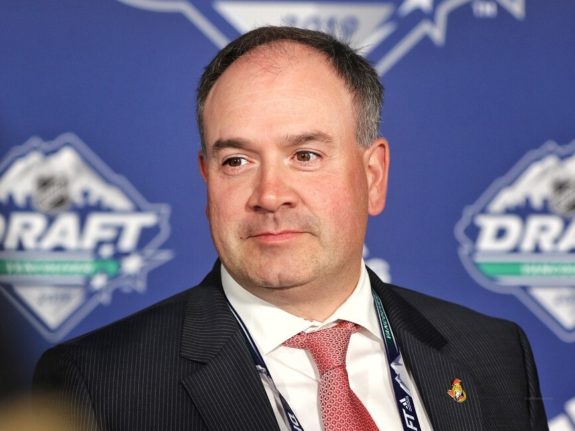On the plus side, Ottawa Senators forward Anthony Duclair just technically had the best season of his career. On the negative side, that muddies the waters, putting the Sens at risk of overpaying the pending restricted free agent.
Duclair vs. White
Granted, these are the Eugene Melnyk-owned Senators we’re talking about, so the risk of them overpaying anyone is relatively low. However, this is the same team that opted to give Colin White a six-year, $28.5 million deal at the age of 22 with less than 100 games of NHL experience.

The White deal may still turn out to be a good one, because he may very well have yet to reach his ceiling after a 41-point rookie season in 2018-19. The point is Duclair is going to be 25 and the Sens still don’t know what they have in him.
Is Duclair the guy who had 21 goals this past season before the New Year? Or is he the guy that had just two the rest of the way, on his fourth team in two years? While it is tempting to sign Guy No. 1 to a long-term extension, locking up the second could be a critical error for a general manager like Pierre Dorion, who has made many mistakes already.
The Duclair Trade Revisited
In Dorion’s defense, some of his moves have turned out okay. The Erik Karlsson trade to the San Jose Sharks has aged better than expected, as the San Jose Sharks were unexpectedly bad this year and the Senators now own two lottery picks in the upcoming NHL Entry Draft as a result.
Furthermore, the trade that brought Duclair to Ottawa itself has turned out to be a huge win. To recap, Dorion gave up forward Ryan Dzingel and a seventh-round pick to the Columbus Blue Jackets for two second-round picks and Duclair at the 2019 trade deadline.

Not only did Duclair outscore Dzingel this past season, but he also outscored him down the stretch after the trade was made, hinting at hidden top-six potential for the former. Since the trade was made, Duclair has scored 54 points in 87 games with the Senators compared to just 41 in the same amount of games for Dzingel, split between the Blue Jackets and Carolina Hurricanes, with whom he signed a two-year, $6.75 million deal last summer.
Needless to say, Duclair has exceeded expectations, especially considering his $1.65 million cap hit. The question is, at what point salary-wise does Duclair no longer become worth it, if this is as good as it gets for him? As great as he was this past season for all intents and purposes, everyone’s seen this out of Duclair before, namely in 2015-16 when he was still with the Arizona Coyotes.
Duclair Plagued by Inconsistency
That was Duclair’s first complete season in the league after he played just 18 games with the New York Rangers in 2014-15. Coming over to the Coyotes in the Keith Yandle trade, Duclair scored a career-high 44 points in 81 games that 2015-16 campaign. The seasons in between, his development stagnated to say the least. He arguably hit rock bottom when the Chicago Blackhawks, who had acquired him in 2018, opted not to qualify him, after which he signed with the Blue Jackets.
Duclair’s relatively low production in those years can be attributed to a variety of factors, including a lack of stability. In the case of his time with the Blue Jackets, it can be attributed to a lack of confidence in him by head coach John Tortorella.
Whatever the specific reason, it’s clear that Duclair has suffered from consistency issues. Even getting the most ice time of his career with the Senators this past season (16:16 per game with 2:34 on the power play, both career highs), Duclair struggled down the stretch scoring just eight points in his last 25 games.
In effect, there’s a degree of diminishing returns to Duclair’s game. After all, he actually found more overall success in 2018-19 after having just gotten traded to the Sens. Playing approximately two and half fewer minutes then (13:41 on average; 1:37 on the power play), Duclair scored 14 points in 21 contests (0.67 points per game). So, he technically has the skill to be a 55-plus-point scorer in the NHL, but the Sens can’t afford to pay him like one, at least not yet.
Senators in a Position of Strength
With Duclair having played just five “accrued” seasons in the NHL so far, the Senators are actually in a desirable position from a leverage standpoint. That’s only assuming they approach negotiations the right way. According to the Collective Bargaining Agreement, once Duclair has played seven accrued seasons, he is entitled to hit unrestricted free agency. That means, Duclair has effectively two seasons left before he can call his own shot.
So, the Senators must sign Duclair to a one-year, “show-me” contract, ideally at a reasonable amount. Once it expires, they can re-assess his development and determine whether he’s worth re-upping to a long-term deal.

If they ink Duclair to a two-year deal, they risk seeing him walk away for nothing. If they sign him for a term that’s any longer, they risk attaching themselves at the hip to a player, who, between 2016 and his stint with the Sens, scored only 57 points in 167 games. That’s effectively half the clip (0.34 points per game) at which he scored when he first arrived in Ottawa. In other words, the Senators need the real Duclair to stand up… and soon.
In many ways, Duclair is just as much of an unknown as White was last season when he signed his new deal. Duclair just has over three times as many games played in his career, though. Keep in mind that White managed 41 points in 2018-19, one more than Duclair did (40) in what was by all accounts his career season up to this point. Hopefully the Senators remember themselves, because they’ll never forget if they make the wrong move here.